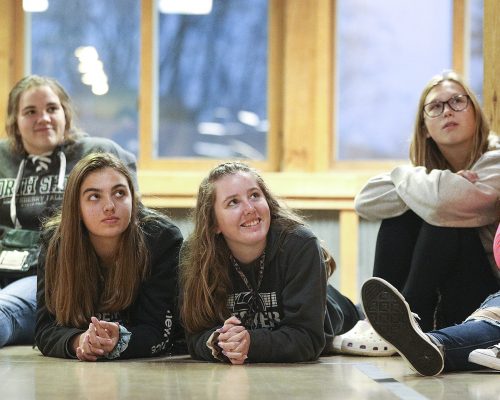Jesse Manibusan, an internationally renowned Catholic musician and composer, visited the Diocese of St. Cloud Oct. 25-29, spending time at Catholic schools as well as with faith formation directors and youth ministers. He spent a day at the Diocesan Catholic Youth Conference in Detroit Lakes. Manibusan also stopped by The Visitor office where he recorded a podcast with editor Joe Towalski. Below are excerpts from the podcast. To listen to the whole message, visit http://minnesotacatholicpodcasts.libsyn.com/voices-of-hope-musician-jesse-manibusan.
Q: The theme of the Diocesan Catholic Youth Conference is “Hold on to Love.” Can you talk a little bit about that theme?

Manibusan: It’s basically about the song I wrote called, “Hold on to Love.” I volunteer at [church], and I have these fifth-graders I do music with at their liturgies almost once a month. [They are] experiencing different kinds of violence — the heartache and the heartbreak in the world, but especially in our own country, the divisiveness. I started thinking about those kids and I started thinking about my grandkids and what they have seen, what their minds have been exposed to in terms of all manner of violence and harm. So I started writing this chorus, “Hold on to Love,” which really is hold on to God’s love, hold on to Christ, hold on to your faith in the best of times and the worst of times.
Q: Amidst all that conflict that you’re talking about, what do you see happening with the youth when they hear your message?
Manibusan: The first thing is they’re surprised. In the beginning, I make an immediate connection by asking the question, “Who’s the church?” It affirms in them, and in the adults that are accompanying them, that the church — although we might say it’s our declarations and our dogma and our doctrine and the physical buildings and the worship spaces and everything — that foundationally we are a people of God, the youngest, the eldest and everybody in between.
We have been baptized, priest, prophet and king, and in knowing that, there’s a freedom and an excitement that God says, “Hey, you’re mine, let’s do something beautiful.” When we affirm that with the youngest and the oldest and everybody in between, that’s a launching point. That’s a pivoting point to remind us that we live in a paschal mystery — the toughest of times, the most beautiful of times, the most hopeful of times.

Q: Youth and young adults are getting a lot of attention from the international church right now with the Synod of Bishops happening in Rome that’s focused on young people, the faith and discernment. What would you like to see come out of that synod? [Note: the synod concluded Oct. 28.]
Manibusan: First of all, I celebrate that there is this synod, that there is yet another remarkable and historical moment of grace in the church where the Holy Spirit’s going to create something new and remarkable. In some ways we are teachers, we are missionaries, but it’s also mission in reverse. What does the young church have to teach us? I pray for true humility and for true courage. I have great hopes that the Spirit will touch the hearts of our leaders and give them a courage to listen and courage to trust.
Q: In a world that’s full of distractions, a world that’s becoming more highly secularized in a lot of ways, how does the church make a real, authentic connection with young people?
Manibusan: I think what young people yearn for is conversation that relates to them, that connects to them where they’re at. They want to feel connected. So we’ve got to go where they are, we have to learn the language that they know and sometimes immerse ourselves into where they are so that we can begin to appreciate and know them. One of the best things we can do is with humility and vulnerability go and be with them. Not with our agenda but simply with our love and our openness to come to know them and to let them inform us who they are.
Q: Right now the church is going through a tough time with all of this news about clergy sexual abuse.How do you think that has been impacting the young people that you have been talking to in recent months?
Manibusan: It’s impacted obviously in negative and painful ways. I believe, in many ways, some of our youth have endured heartache and heartbreak just because we’re slow to learn. As an institution, as an ancient ship, we’re slow to make turns. But we do have our moments, and I think [this] is another moment where we as leaders of church, leaders of the people of God are called again to humility and to vulnerability and to simply listen. Not manage damage.
That’s all part-and-parcel of the response. But this is a season from which we listen to young people and listen to their hurt, listen to their anger, listen to their frustration and just honor it and learn from it and be courageous and help each other be accountable, to take action, to take the words that they give us to heart. And to ask hard questions of ourselves and of our institution because they’re the ones who are hurting, they’re the ones [in whom] we are placing our future, the hands of our tradition of our faith, into their hands and hearts.
Q: Is there something that we older adults could do better to help young people on their journey of faith?
Manibusan: Something very practical is to write ourselves a letter. Dear [self], in what ways have I grown? Emotionally? Spiritually? In what ways have I seen myself grow in trust of my neighbor? In what ways do I still fear? Do I still hold on to beliefs that aren’t life giving? What ways do I still need to surrender and ask the Holy Spirit to transform those beliefs and those fears? In what ways?
That’s one practical thing we can do. We call that an examination of conscience. Another thing, read. Be part of a study group. Stretch our imagination, to stretch our Catholic imagination and say, again, how can I grow? How can I be more inclusive?
Q: While here, you are speaking with adults around the power of music in ministry. Can you talk briefly about what that power is?
Manibusan: Music ministry is about ministry first, foremost and forever in my heart of hearts. When I first started doing this work, I thought I needed to do my music at the nursing home, but there’s no power to my music at the nursing home. But if I sang, “You Are My Sunshine” and “He’s Got The Whole World” and “Stella by Starlight” and “I Left My Heart in San Francisco,” there’s the power.
I can remember the volunteer director saying this is the first time that a group came in and sang their music and that’s why they sang and that’s why they clapped. When you go to a juvenile hall and you play their music, then you share a word of hope, you connect with where they are. I always thought it was the music and it was the song. Turns out, it’s not. It’s the ministry, it’s the mission, it’s the service. That’s where the power is.



























